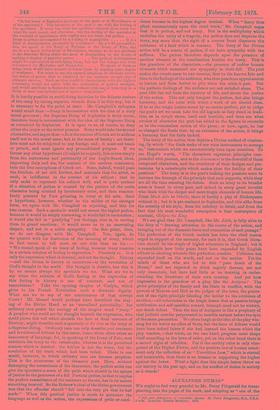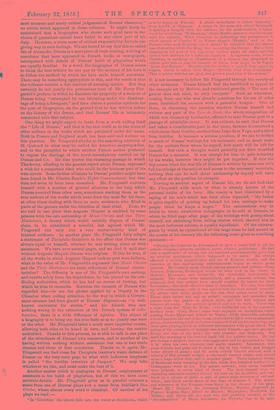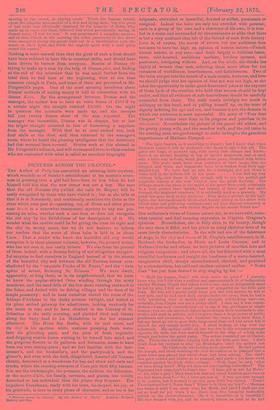ALEXANDRE DUMAS.• Wir ought to feel very grateful to Mr.
Percy Fitzgerald for trans- planting into the pages of his work, and adopting as " one of the
• Life and Adeenlures of Alexandre Dumf. By Percy Fitzgerald, F.S.A. 2 role. London: Tinsley Brothers. 1873. most accurate and nicely critical judgments of Dumas' character," an article which appeared in these columns. It might fairly be maintained that a biographer who shows such good taste in the choice of quotations cannot have failed in any other part of his duty. However, a stern sense of critical responsibility forbids our giving way to such feelings. We are bound to say that this so-called life of Alexandre Dumas is a mere piece of book-making, a string of anecdotes that have appeared in French books or newspapers, interspersed with details of Dumas' habit of plagiarism which are equally familiar. In a word, the biographer of Dumas seems to think the best tribute be can pay to the memory of his hero is to follow the method by which his hero made himself notorious. There may be something appropriate in this, and the result is that the volumes contain a fair amount of amusing matter. But they certainly do not justify the pretentious tone of Mr. Percy Fitz- gerald's preface, in which he discusses the propriety of a memoir of Dumas being "attempted by one labouring under the disadvan- tage of being a foreigner," and then claims a peculiar aptitude for the post of biographer, on the ground that he has written before On the history of the drama, and that Dumas' life is intimately connected with that subject.
One thing we might expect to learn from a work calling itself the "Life of Dumas," and that is the real truth as to the share of other authors in the books which are published under his name. Both in France and England much has been said and written on this question. Mr. Fitzgerald alludes to the searching criticism of M. Querard in what may be called his detective encycloptelias, and to the pamphlet in which another French author professed to expose the dealings of the novel-manufactory carried on by Dumas and Co. He also quotes the charming passage in which Thackeray, alluding to the general report about Dumas, expressed a wish for a competent clerk who could do the business part of his own novels. Some further allusions to Dumas' practice might have been found in Mr. Charles Reade's Eighth Commandment, but that does not seem to have been consulted. Mr. Fitzgerald contents himself with a number of general allusions to the help which Dumas received from other men, sometimes ranking them as the true authors of the works which have done the most for his fame, at other times dealing with them as mere assistants who filled-in parts of the picture under the direction of their chief. Thus, we are told in one place that Auguste Maquet is credited by some persons with the sole authorship of Monte Christo and the Three Musketeers, a theory which would entirely dispose of Dumas' claim to be considered a novelist, but against which Mr. Fitzgerald can only cite a very untrustworthy kind of internal evidence. In another place Mr. Fitzgerald fully adopts a statement of Theophile Gautier's to the effect that Dumas was always equal to himself, whether he was writing alone or with assistance. We turn over several pages, and we find it said that without Auguste Maquet Dumas was helpless. If this be true, if all the works in which Auguste Maquet took no part were failures, what is the value of Mr. Fitzgerald's argument that Monte Christo and the Three Musketeers are exact reflections of Dumas' charac- teristics? The difficulty is one of Mr. Fitzgerald's own making, and results solely from the dependence he has placed on the co-n- fficting authorities, which he has had no means of testing, but which he tries to reconcile. Between the enemies of Dumas who regarded him—to use the phrase applied by a Deputy in the Chamber when calling attention to the way in which a Govern- ment steamer had been placed at Dumas' disposal—as "a well- known contractor for stories," and his friends who saw nothing wrong in the extension of the French system of colla- boration, there is a wide difference of opinion. The object of a biography is to bring out the true facts so as to justify one view or the other. Mr. Fitzgerald takes a much more impartial course, allowing both sides to be heard in turn, and leaving the matter undecided. Thanks to this process, he is able to talk in one place of the abundance of Dumas' own resources, and in another of his having written nothing without assistance but one or two crude dramas and three or four novelettes. Thanks to it again, Mr. Fitzgerald can find room for Theophile Gautier's warm defence of Dumas on the very next page to what with ludicrous inaptness is called "the terrible invective of Jacquot." We may take whichever we like, and must make the best of it.
Another matter which is analogous to Dumas' employment of assistants is his habit of plagiarism, but of this we have more accurate details. Mr. Fitzgerald gives us in parallel columns a nesse from one of Dumas' playa and a scene from Schiller's Don Carlos, where almost every word is identical. Of another of his plays we read :— "In ' Christine' the Queen falls into the water at Stockholm, which is to be found in ' Fieschi.' A whole monologue is taken 'textually' from Act IV. of 'Egmont.' A scene in the same act, where Sentinelli is making a bargain with the soldiers for the assassination, is taken word for word from Wallenstein,' where Butler makes a similar treaty with the soldiers. When Christine is abdicating she paraphrases a whole speech of Charles V. in Victor Hugo's Ernani ;' and as the French critic acutely points out, it should be observed that the Queen was abdicating while the King was ascending the throne. But a little shaping on the part of the ingenious worker made all right, and the speech now answers for a different situation. A vigorous scene, where Christine, in speaking to Monableschi of a treason she suspected in others, gets him to convict himself, is taken from Lopo do la Vega's. ' Love and Honour.' Monaldeschi also recites a speech four pages in length, which is taken from Hugo's • Derider Jour d'un Condatnne." This is pretty well for one play, and gives a good idea of the system."
It is not necessary to follow Mr. Fitzgerald through the variety of other instances. Dumas himself bad the hardihood to appeal to the example set by Moliere, and exclaimed grandly, "The man of genius does not steal, he only conquers." Such an admission, coming from one who was already notorious for his use of other pens, furnished his enemies with a powerful weapon. One of them, in discussing the question whether Dumas himself had written any part of the Tour de Neste, the whole composition of which was claimed by Gaillardet, affected to take Dumas' part in a passage of admirable irony. It was evident, he said, that Dunne had taken a considerable part in the piece, because it contained a whole scene from Goethe, another from Lope de In Vega, and a third from Schiller. It becomes a serious question, if we are to deduct so much of Dumas' writings for his assistants, and so much more for the authors from whom he copied, how much will be left for himself. But such a thought would probably not have troubled Dumas for a moment. It was enough for him to gain notoriety by his works, however they might be put together. If ever the day comes when the real life of Dimas is written by some one with full knowledge of the subject and access to the necessary materials, nothing that can be said about authorship by deputy will have any effect on the position ho occupies.
Turning to another aspect of Dumas' life, we do not find that Mr. Fitzgerald adds much to what is already known of the personal habits of hia hero. His vanity is best illustrated by a saying of his son's which has been often repeated, "My father is quite capable of getting up behind his own carriage to make people think he keeps a negro." The ostentatious way in which he wrote numberless autographs to be sold at bazaars, in which he filled page after page of his writings with gossip about himself, not shrinking from telling stories which showed him in the most ludicrous colours, is equally significant. Of the extrava- gance by which he squandered all the large sums he had earned in the course of his literary life the following scene gives us a striking specimen : -
"Dining the Carnival ho determined to give a fancy ball to all his artistic friends,—players, painters, poets, editors, politicians. He had only a small suite of rooms, but his landlord good-naturedly gave him up another apartment, which happened to be uulet. Ho always affected a certain magnificence and air of Eastern wealth, and the rumours of this approaching entertainment began to excite great interest. He counted many friends among painters and artists,—Tony Joannot, Delacroix, Boulanger, whom he later took in his 'suite' to Madrid ; Decamps; and Granville, the wonderful caricaturist of animals. The rooms were unfinmishod, and a pleasant scheme was proposed, that this artistic force should combine its talent for their decoration,—the most effective kind of furniture. The idea was taken up with enthusiasm ; only it was agreed that the host should 'nourish' his artists with three meals on the day, they going away to sleep. Three days before the ball an artist's colourman had stretched the canvas over the panels in proper style, and had laid colours and brushes all ready. The painters arrived and set to work. There was a scene from the 'Tour de Noslo,' (was Gaillardet one of the guests?) another from Chic! Mars ;' some were engaged on medallions repre- senting Victor Hugo and Alfred de Vigny ; while Granville, selecting a broad panel at the end of the room, proceeded to fill it with an admirable group, representing a full orchestra composed of all his favourite dogs and other pets playing away on different instruments with great effect. The notion of the orchestra, of animals was truly French,—gay and spirituel. Every one was at his task ; the only absentee was Delacroix. Not until the morning of the festival itself did the painter arrive. He had not chosen a subject; but one was suggested, and he proceeded to dash it in' after his own vigorous and poetic manner. Alexander, with some friends, had gone out to shoot a day or two before, and brought home plenty of game ; and by seven o'clock Chevet arrived with a salmon of fifty pounds' weight, a chevreuil roasted entire, and served upon a huge silver dish, and a monster pasty. Throe hundred bottles of Bordeaux were warming at the fire, while five hundred bottles (!) of Champagne were in ice. The guests arrived; over seven hundred were present, in every kind of dross. The host himself wore ' a charming sixteenth-century dress ;' his hair on his shoulders, and con- fined by a circlet of gold ; a pair of green tunic trowsors of rod and white ; and black velvet shoes of the time of Francis I. The actors and actresses of the Francais wore there in the dresses of his play, 'Henri IIL ;' Dejazet ; the charming Falcon; Rossini, disguised as Figaro ; Eugene 'Sue ; Alfred de Musset; Roqueplan ; Frederick Le Maitre ; and, above all, the man who had probably assisted at the descampativos' of Marie Antoinette, La Fayette, was to be seen
moving in the crowd, or playing cards. Tissot, the famous savant, chose the singular masquerade of a sick and dying man; but this piece of bad taste was effectually chastised by the humour of Jadin, who, made up in crape and linen, followed him about persistently, saying, in dismal voice, 'I wait for you: It was pronounced a complete success ; and at nine o'clock in the morning the sober passers-by in the street were amazed at seeing the guests rush out in a bacchanalian rout, the music at their head, and finish the nightly sport with a mad galop round the square."
Nothing is more natural than that the giver of such a feast should have been reduced in later life to constant shifts, and should have been driven to borrow from everyone. Stories of Dumas fits trying to make up a sum by the help of Dumas pere, and finding at the end of the interview that he was much further from the total than he had been at the beginning, were at one time common enough in Paris, and some of them are preserved in Mr. Fitzgerald's pages. One of the most amusing anecdotes about Dumas' methods of raising money is told in connection with his -drama Kean. By the arrangement between Dumas and the manager, the author was to have an extra bonus of £100 if by -a certain night the receipts touched £2,000. On the night in question the accounts were made up, and the receipts fell just twenty francs short of the sum required. The manager was inexorable, Dumas was in despair, but at last the bright thought occurred to him of borrowing a napoleon from the manager. With that he at once rushed out, took four stalls at the door, and then returned to the manager's zoom, where be heard the pleasing intelligence that the deficiency had that moment been covered. Stories such as this abound in Mr. Fitzgerald's volumes, and will recommend them to those readers who are contented with what is called an anecdote biography.




































 Previous page
Previous page